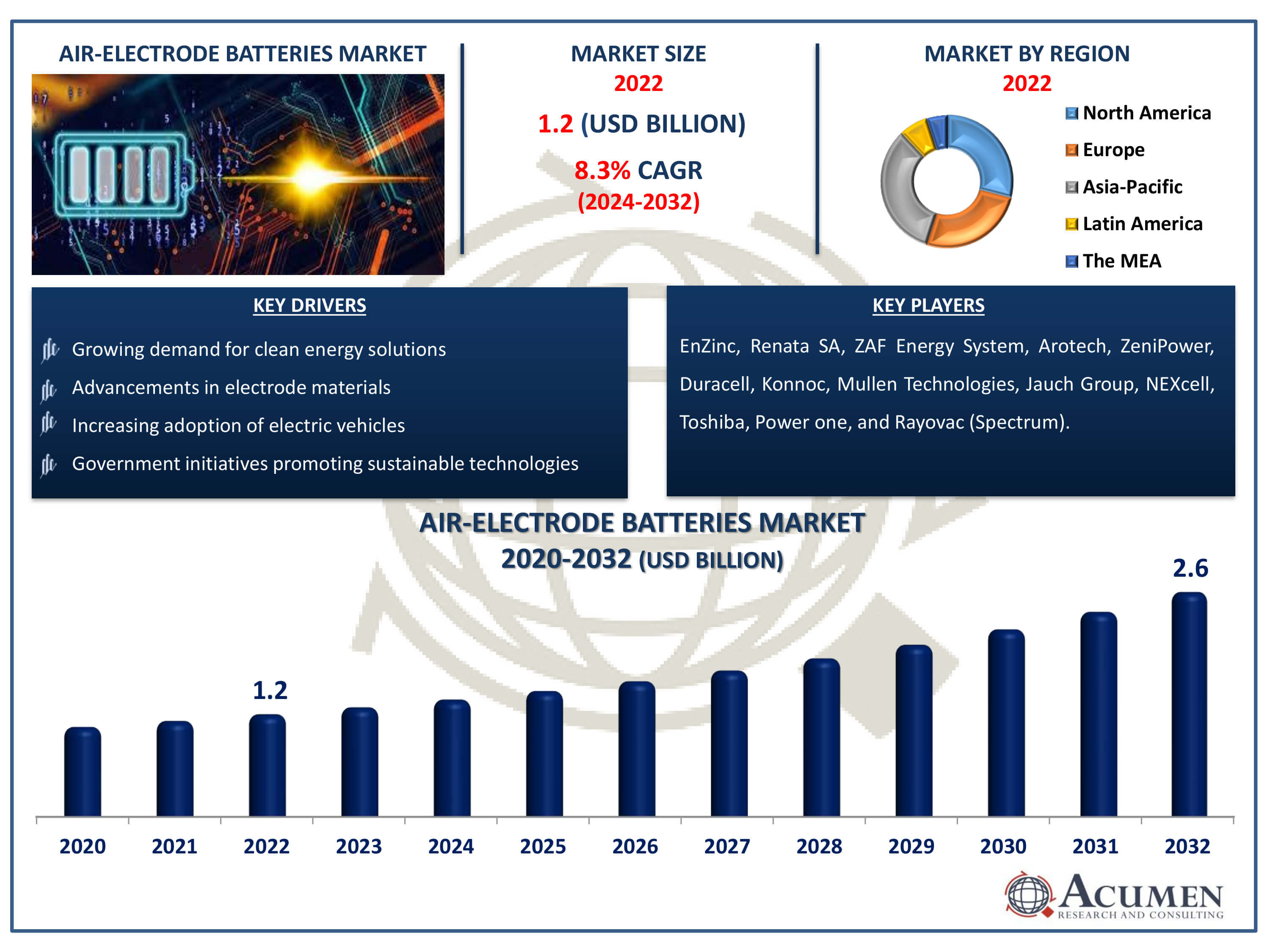Air-Electrode Batteries Market Size - Global Industry, Share, Analysis, Trends and Forecast 2024 - 2032
Published :
Report ID:
Pages :
Format :
Air-Electrode Batteries Market Size - Global Industry, Share, Analysis, Trends and Forecast 2024 - 2032
Report Coverage
- Industry Dynamics
- Market Size and Forecast Data
- Segment Analysis
- Competitive Landscape
- Regional Analysis with a Niche Focus on Country-Level Data
- High Level Analysis - Porter's, PESTEL, Value Chain, etc.
- Company Profiles of Key Players
- Option to Customize the Report As Per Your Specific Need
Request Sample Report
The Air-Electrode Batteries Market Size accounted for USD 1.2 Billion in 2022 and is estimated to achieve a market size of USD 2.6 Billion by 2032 growing at a CAGR of 8.3% from 2024 to 2032.
Air-Electrode Batteries Market Highlights
- Global air-electrode batteries market revenue is poised to garner USD 2.6 billion by 2032 with a CAGR of 8.3% from 2024 to 2032
- Asia-Pacific air-electrode batteries market value occupied around USD 399.3 million in 2022
- North America air-electrode batteries market growth will record a CAGR of more than 9% from 2024 to 2032
- Among battery type, the secondary battery sub-segment generated around USD 592.9 million revenue in 2022
- Based on application, the transportation sub-segment generated more than 45% air-electrode batteries market share in 2022
- Rising demand for energy storage solutions in smart grids is a popular air-electrode batteries market trend that fuels the industry demand

Air electrode batteries, which range in size from tiny button-type cells to massive batteries used for vehicle propulsion, get their power from the oxidation of elements with high energy density. For both non-rechargeable (also known as primary batteries) and rechargeable (also known as secondary batteries) applications, these batteries make use of metal resources such magnesium, iron, aluminum, lithium, zinc, and sodium. There are also continuous oxygen batteries, sometimes known as fuel cells, which are an air electrode battery type. Comparing this technology to other battery types now on the market, it is a relatively recent breakthrough.
Global Air-Electrode Batteries Market Dynamics
Market Drivers
- Growing demand for clean energy solutions
- Advancements in electrode materials
- Increasing adoption of electric vehicles
- Government initiatives promoting sustainable technologies
Market Restraints
- Challenges in scalability for large-scale applications
- High initial investment costs
- Limited infrastructure for battery recycling
Market Opportunities
- Emerging applications in aerospace and marine industries
- Technological innovations enhancing battery performance
- Expansion of renewable energy integration
Air-Electrode Batteries Market Report Coverage
| Market | Air-Electrode Batteries Market |
| Air-Electrode Batteries Market Size 2022 | USD 1.2 Billion |
| Air-Electrode Batteries Market Forecast 2032 |
USD 2.6 Billion |
| Air-Electrode Batteries Market CAGR During 2024 - 2032 | 8.3% |
| Air-Electrode Batteries Market Analysis Period | 2020 - 2032 |
| Air-Electrode Batteries Market Base Year |
2022 |
| Air-Electrode Batteries Market Forecast Data | 2024 - 2032 |
| Segments Covered | By Battery Type, By Application, And By Geography |
| Regional Scope | North America, Europe, Asia Pacific, Latin America, and Middle East & Africa |
| Key Companies Profiled | EnZinc, Renata SA, ZAF Energy System, Arotech, ZeniPower, Duracell, Konnoc, Mullen Technologies, Jauch Group, NEXcell, Toshiba, Power one, and Rayovac (Spectrum). |
| Report Coverage |
Market Trends, Drivers, Restraints, Competitive Analysis, Player Profiling, Covid-19 Analysis, Regulation Analysis |
Air-Electrode Batteries Market Insights
Given that they are more efficient than fossil fuels in terms of cost and environmental effect, air electrode cells are expected to usher in a new era of renewable energy storage. By offering themselves as a viable option in the shift to greener energy sources, these cells provide considerable potential to satisfy the rising need for sustainable energy solutions. Regulatory rules and technological competition are two of the industry's many obstacles, despite the air electrode battery sector's bright future. Widespread adoption may be hampered by regional legislative frameworks, yet the quick speed of technical breakthroughs demands constant innovation to remain competitive.
Nonetheless, the distinct qualities of air electrode batteries such as their high energy density, lightweight construction, and extended lifespan support the market for these batteries. These characteristics not only make them appealing for a variety of applications, but they also propel the market's expansion by meeting crucial sustainability and performance criteria. Air electrode batteries are gaining popularity in the transportation industry, especially for use in electric vehicles (EVs), in addition to their potential in stationary energy storage systems. Compared to traditional lithium-ion batteries, these batteries can provide longer driving ranges and shorter charging times, which makes them a potential solution for removing significant obstacles to the widespread adoption of EVs.
Moreover, grid-scale energy storage projects may use air electrode battery technology due to its scalability, which makes it easier to handle renewable energy sources effectively and improves system stability. Air electrode batteries have the potential to be a key player in determining how the renewable energy landscape develops in the future, given the growing demand for dependable and sustainable energy storage options.
Air-Electrode Batteries Market Segmentation
The worldwide market for air-electrode batteries is split based on battery type, application, and geography.
Air-Electrode Battery Market By Type
- Primary Battery
- Secondary Battery
- Fuel Cell
According to air-electrode batteries industry analysis, the secondary battery segment dominates market because of its broad applicability across several sectors and its adaptability. When it comes to affordability and environmental sustainability, secondary batteries also referred to as rechargeable batteries offer a number of benefits over primary batteries. Because secondary batteries can be recharged and used again, they are a popular option for long-term energy storage solutions, which is one of the main factors contributing to their supremacy. This function lowers the environmental effect of battery manufacture and disposal while also saving end customers' operating costs.
In addition, compared to main batteries, secondary batteries have better performance features including a greater energy density, a longer lifespan, and quicker charging speeds. These characteristics make them appropriate for a variety of uses, including as integration with renewable energy sources, electric cars, portable devices, and grid energy storage systems. The market is expanding because to the rising demand for energy-efficient technologies and the developments in secondary battery technology. The secondary battery market is expected to continue growing and innovating as consumers and industries alike place a greater emphasis on energy independence and sustainability. This will propel the air-electrode battery industry's evolution towards a more efficient and sustainable future.
Air-Electrode Battery Market By Application
- Medical Devices
- Transportation
- Military Devices
- Others
The transportation category is the biggest in the market and it is expected to grow throughout the air-electrode batteries industry forecast period, owing to its critical role in powering different types of transportation such as electric vehicles (EVs), hybrid electric vehicles (HEVs), and unmanned aerial vehicles (UAVs), among others. The growing worldwide focus on decreasing greenhouse gas emissions and preventing climate change has resulted in a substantial movement towards electrification in the transportation industry. Electric cars, in particular, have seen increasing acceptance as customers and regulators seek cleaner and more sustainable alternatives to traditional fossil-fueled vehicles.
Air-electrode batteries play an important role in allowing wider adoption of electric mobility by providing essential benefits such as better energy density, longer driving ranges, and faster charging periods than traditional lithium-ion batteries. These batteries also help to reduce the total weight of electric cars, which improves their efficiency and performance. Plus, the Transportation section includes a diverse spectrum of applications, such as electric buses, trucks, scooters, and even aeroplanes. Military applications such as electric-powered drones and tactical vehicles help to drive the expansion of this market.
Air-Electrode Batteries Market Regional Outlook
North America
- U.S.
- Canada
Europe
- U.K.
- Germany
- France
- Spain
- Rest of Europe
Asia-Pacific
- India
- Japan
- China
- Australia
- South Korea
- Rest of Asia-Pacific
Latin America
- Brazil
- Mexico
- Rest of Latin America
The Middle East & Africa
- South Africa
- GCC Countries
- Rest of the Middle East & Africa (ME&A)

Air-Electrode Batteries Market Regional Analysis
In terms of air-electrode batteries market analysis, Asia-Pacific area is the largest in the industry, owing to a confluence of several variables. With a fast developing industrial environment, booming urbanization, and a constantly growing population, Asia-Pacific nations such as China, Japan, and South Korea have emerged as hotspots for energy consumption. In response to this need, significant investments have been made in the development of renewable energy infrastructure and the implementation of electric vehicle solutions. These activities are frequently motivated by government policies aimed at supporting sustainable development and resolving environmental issues, hence creating a favorable climate for the spread of air-electrode battery technology.
North America, on the other hand, emerges as the fastest-growing area and it will expected to grow continue over the air-electrode battery market forecast period, owing to a number of variables that drive innovation and market development. The region has a strong technical environment, with major expenditures in R&D driving advances in battery technology. Furthermore, North America is seeing a significant increase in investments in electric transportation infrastructure and renewable energy projects, fueled by both government programs and private sector engagement. Supportive laws and incentives aimed at lowering carbon emissions and stimulating innovation help to drive the rapid expansion of the air-electrode battery market in North America, placing it as a major location in the worldwide transition to sustainable energy solutions.
Air-Electrode Batteries Market Players
Some of the top air-electrode batteries companies offered in our report includes EnZinc, Renata SA, ZAF Energy System, Arotech, ZeniPower, Duracell, Konnoc, Mullen Technologies, Jauch Group, NEXcell, Toshiba, Power one, and Rayovac (Spectrum).
Frequently Asked Questions
How big is the air-electrode batteries market?
The air-electrode batteries market size was valued at USD 1.2 billion in 2022.
What is the CAGR of the global air-electrode batteries market from 2024 to 2032?
The CAGR of air-electrode batteries is 8.3% during the analysis period of 2024 to 2032.
Which are the key players in the air-electrode batteries market?
The key players operating in the global market are including EnZinc, Renata SA, ZAF Energy System, Arotech, ZeniPower, Duracell, Konnoc, Mullen Technologies, Jauch Group, NEXcell, Toshiba, Power one, and Rayovac (Spectrum).
Which region dominated the global air-electrode batteries market share?
Asia-Pacific held the dominating position in air-electrode batteries industry during the analysis period of 2024 to 2032.
Which region registered fastest CAGR from 2024 to 2032?
North America region exhibited fastest growing CAGR for market of air-electrode batteries during the analysis period of 2024 to 2032.
What are the current trends and dynamics in the global air-electrode batteries industry?
The current trends and dynamics in the air-electrode batteries industry include growing demand for clean energy solutions, advancements in electrode materials, increasing adoption of electric vehicles, and government initiatives promoting sustainable technologies.
Which application held the maximum share in 2022?
The transportation application held the maximum share of the air-electrode batteries industry.


